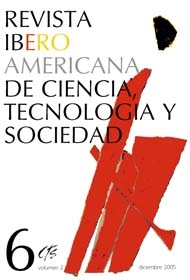The collective forms of university research
DOI:
https://doi.org/10.52712/issn.1850-0013-985Keywords:
higher education research, research groupAbstract
The recognition of the collective nature of knowledge production in academic settings is already a common place. The research group is the minimum time and space unit of knowledge production of a collective character. Despite the fact that research groups are often part of the description of many academic entities, at both institutional and cognitive levels, they have not become a privileged object of study in the specialized literature on science, technology and society. The difficult development of empirical approaches for the systematic study of research groups is one of the reasons that may explain its absence in the literature. This article analyzes the experience of a comprehensive recent study of university research groups. The study involved a call for the auto-identification of research groups at the Universidad de la República, Uruguay, based on the acknowledgment that the notion of identity plays a structuring role in the configuration of research groups. The article examines the particularities of the approach designed to identify university research groups and collect data for their characterization. In addition, it analyzes selected research results regarding the basic traits and activities of these collectives units.
Downloads
References
ARGENTI, G., FILGUEIRA, C., SUTZ, J. (1988): Ciencia y Tecnología: un diagnóstico de oportunidades, Montevideo, MEC/CIESU.
BAULEO, A. (1977): Contrainstitución y grupos. México, D.F, Editorial Fundamentos.
BELLAVISTA, J., ESCRIBANO, L., GRABULÓS, M., VIALDIU, C., GUARDIOLA, E., IGLESIAS, C. (1993): Política Científica y Tecnológica. Evaluación del I+D en la Universitat de Barcelona, Barcelona, Universitat de Barcelona.
BEN-DAVID, J. (1984): The Scientist’s Role in Society, Chicago, The University of Chicago Press.
BENNER, M. (2001): “Advantages and disadvantages of scientific networking in the era of ‘globalisation’” Disponible en: www.sasnet.lu.se/bennerpaper.pdf (acceso Noviembre 2003).
BIANCO, M. (2001): “Una aproximación conceptual a los grupos o colectivos de investigación”, presentado en Primer Taller Teórico-Metodológico de Estudios Sociales de la Ciencia, Universidad Nacional de Quilmes, Buenos Aires.
BIANCO, M., MUJICA, A., SUTZ, J. y VISCARDI, N. (1999): “Centros, Programas y Redes de Excelencia entre Países del MERCOSUR, Bolivia y Chile”, Capítulo Uruguay, Informe de investigación, Montevideo, CINDA-OEA.
CNPq (2002): “Como é feita a aquisição dos dados do Diretório?” Disponible en: http://lattes.cnpq.br/diretorio (acceso Marzo 2005).
CNPq (s/f): A Pesquisa no Brasil, Brasilia, CNPq.
CNPq (1995): Directório dos Grupos de Pesquisa no Brasil, Versao 2.0., Brasilia, CNPq.
COLCIENCIAS. (2002): “VI Convocatoria a Grupos Colombianos de Investigación Científica o Tecnológica”. Disponible en: www2.colciencias.gov.co:8888/sncyt/pdfs/grupos2002.pdf (acceso Junio 2003).
ETZKOWITZ, H. (1992): “Individual Investigators and Their Research Groups”, Minerva 30: 28-50.
HOGG. M. y ABRAMS, D. (1988): Social Identifications, London, Routledge.
LARÉDO, P. (2001): “Benchmarking of RTD policies in Europe: ‘research collectives’ as an entry point for renewed comparative analyses”, Science and Public Policy 28(4): 285-294.
LARÉDO, P. (1999): “Report on the Development of a Reproducible Method for the Characterisation of a Large Set of Research Collectives. A test on human genetics in Europe”, Paris, Armines/CSI.
OLSON, M. (2000): The logic of collective action. Public goods and the theory of groups. Cambridge, MA., Harvard University Press.
PICHON-RIVIÈRE, E. (1985): El proceso grupal. Del psicoanálisis a la psicología social (I). Buenos Aires, Nueva Visión.
SECRETARÍA DE CIENCIA Y TÉCNICA (UBA) (1996): “Análisis global de la investigación en quince áreas del conocimiento en la Universidad de Buenos Aires”, Serie Ciencia y Tecnología en la UBA. Disponible en: www.rec.uba.ar/Documentos/analisis.pdf (acceso Junio 2004).
SMITH, D. (2001): “Collaborative Research: Policy and the Management of Knowledge Creatin on the UK Universities”, Higher Education Quarterly 55(2): 131-157.
UNIDAD ACADEMICA (2003): Grupos de Investigación en la Universidad de la República, Montevideo, CSIC-UDELAR.
WEBER, M. (1993): Basic Concepts in Sociology, New York, Citadel Press.
ZIMAN, J. (2000): Real Science. What is, what it means, Cambridge, UK., Cambridge University Press.
Downloads
Published
How to Cite
Issue
Section
License
Copyright (c) 2025 CC Attribution 4.0

This work is licensed under a Creative Commons Attribution 4.0 International License.
All CTS's issues and academic articles are under a CC-BY license.
Since 2007, CTS has provided open and free access to all its contents, including the complete archive of its quarterly edition and the different products presented in its electronic platform. This decision is based on the belief that offering free access to published materials helps to build a greater and better exchange of knowledge.
In turn, for the quarterly edition, CTS allows institutional and thematic repositories, as well as personal web pages, to self-archive articles in their post-print or editorial version, immediately after the publication of the final version of each issue and under the condition that a link to the original source will be incorporated into the self-archive.











